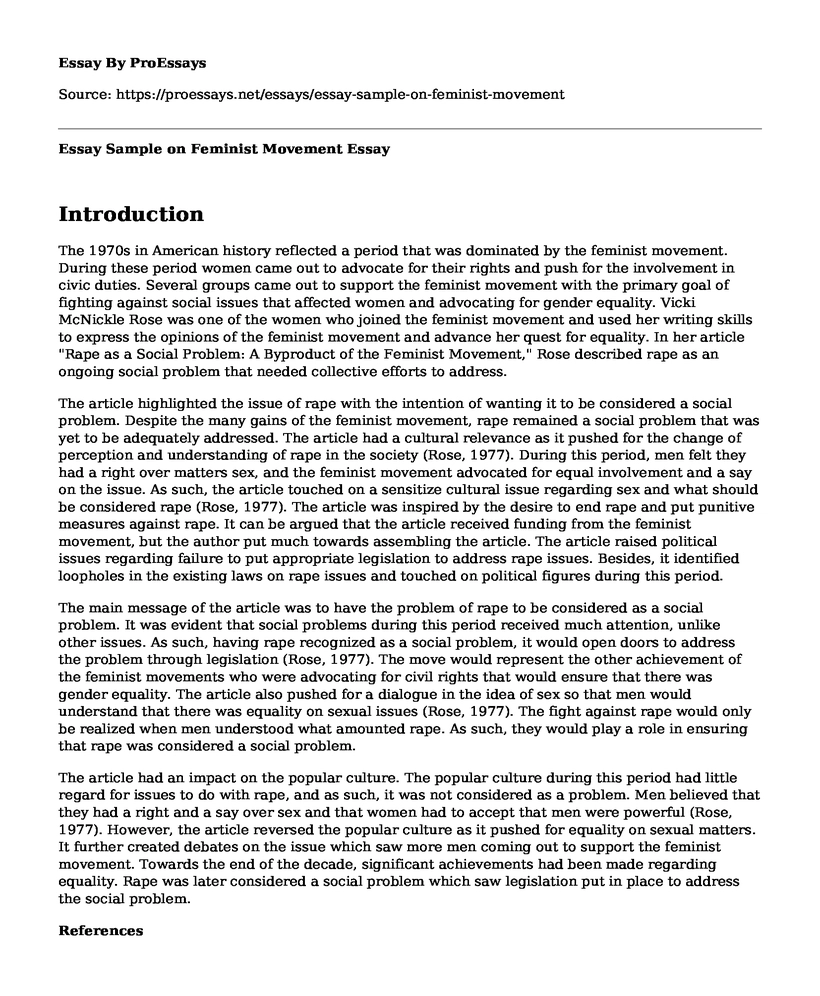Introduction
The 1970s in American history reflected a period that was dominated by the feminist movement. During these period women came out to advocate for their rights and push for the involvement in civic duties. Several groups came out to support the feminist movement with the primary goal of fighting against social issues that affected women and advocating for gender equality. Vicki McNickle Rose was one of the women who joined the feminist movement and used her writing skills to express the opinions of the feminist movement and advance her quest for equality. In her article "Rape as a Social Problem: A Byproduct of the Feminist Movement," Rose described rape as an ongoing social problem that needed collective efforts to address.
The article highlighted the issue of rape with the intention of wanting it to be considered a social problem. Despite the many gains of the feminist movement, rape remained a social problem that was yet to be adequately addressed. The article had a cultural relevance as it pushed for the change of perception and understanding of rape in the society (Rose, 1977). During this period, men felt they had a right over matters sex, and the feminist movement advocated for equal involvement and a say on the issue. As such, the article touched on a sensitize cultural issue regarding sex and what should be considered rape (Rose, 1977). The article was inspired by the desire to end rape and put punitive measures against rape. It can be argued that the article received funding from the feminist movement, but the author put much towards assembling the article. The article raised political issues regarding failure to put appropriate legislation to address rape issues. Besides, it identified loopholes in the existing laws on rape issues and touched on political figures during this period.
The main message of the article was to have the problem of rape to be considered as a social problem. It was evident that social problems during this period received much attention, unlike other issues. As such, having rape recognized as a social problem, it would open doors to address the problem through legislation (Rose, 1977). The move would represent the other achievement of the feminist movements who were advocating for civil rights that would ensure that there was gender equality. The article also pushed for a dialogue in the idea of sex so that men would understand that there was equality on sexual issues (Rose, 1977). The fight against rape would only be realized when men understood what amounted rape. As such, they would play a role in ensuring that rape was considered a social problem.
The article had an impact on the popular culture. The popular culture during this period had little regard for issues to do with rape, and as such, it was not considered as a problem. Men believed that they had a right and a say over sex and that women had to accept that men were powerful (Rose, 1977). However, the article reversed the popular culture as it pushed for equality on sexual matters. It further created debates on the issue which saw more men coming out to support the feminist movement. Towards the end of the decade, significant achievements had been made regarding equality. Rape was later considered a social problem which saw legislation put in place to address the social problem.
References
Rose, V. M. (1977). Rape as a social problem: A byproduct of the feminist movement. Social Problems, 25(1), 75-89.
Cite this page
Essay Sample on Feminist Movement. (2022, Nov 02). Retrieved from https://proessays.net/essays/essay-sample-on-feminist-movement
If you are the original author of this essay and no longer wish to have it published on the ProEssays website, please click below to request its removal:
- Questions and Answers on Ethics, Charity, Animal Rights
- Becoming an American and The Making of Asian America Videos Analysis
- Paper Example on 'Acting White' Theory
- Utilitarianism and Illegal Abortions Essay Example
- Essay on Deaf Man Files Discrimination Case Against Oakland County
- Essay Sample on Drug & Substance Testing: Protecting Employees & Organizations
- Domestic Violence: A Leading Health Problem in the U.S. - Essay Sample







